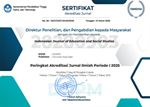Abdullah, A. (2024). Innovative Approach in Curriculum Development; Improving Education and Training Programs through Multidimensional Strategies. PEDAGOGIK: Jurnal Pendidikan, 11(2), 160–179.
Alwehebi, K. A. (2023). Primary School Teachers of Social Science, Islamic Studies, and Arabic Language: A Study of Attitudes of NNEST. Information Sciences Letters, 12(4), 1195–1203. https://doi.org/10.18576/isl/120435
Aziz, A. L., & Sain, S. H. (2025). Sustainable Legal Education: Aligning Curricula with the 2030 Agenda for Sustainable Development. GAS Journal of Law and Society (GASJLS), Volume-02(Issue-01), 10–19. https://gaspublishers.com/gasjls/
Chang, X. (2024). Assessing the Development of Primary English Education based on CIPP Model—A Case Study from Primary Schools in China. Frontiers in Psychology, 15. https://doi.org/10.3389/fpsyg.2024.1273860
Fawaid, A., Hamzah, M., Rohimah, Munawwaroh, I., & Putri, D. F. (2025). AI-based Career Management to Improve the Quality of Decision Making in Higher Education. 2025 15th IEEE Integrated STEM Education Conference, ISEC 2025, 1–8. https://doi.org/10.1109/ISEC64801.2025.11147274
Finn, V. (2022). A Qualitative Assessment of QCA: Method Stretching in Large-N Studies and Temporality. Quality and Quantity, 56(5), 3815–3830. https://doi.org/10.1007/s11135-021-01278-5
Herlina, A. (2024). Mindful Messaging: Public Relations (PR) Strategies in Schools By Using Hierarchy of Effects. Managere: Indonesian Journal of Educational Management, 6(1), 98–110. https://doi.org/10.52627/managere.v6i1.429
Huang, S. H. (2025). Evaluating the English for General Purposes (EGP) program at a Taiwanese University: A CIPP (context, input, process, and product) model study. Evaluation and Program Planning, 112. https://doi.org/10.1016/j.evalprogplan.2025.102662
Idrus, A. (2025). Evaluation of Education Program Implementation at Pusat Kegiatan Belajar Masyarakat (PKBM), Jambi City. Evaluation and Program Planning, 111. https://doi.org/10.1016/j.evalprogplan.2025.102535
Isnaniah, S., & Mustofa, F. (2020). Management of Islamic Education on Indonesian Language Learning for Foreign Speaker Program. Jurnal Pendidikan Islam, 6(2), 217–232. https://doi.org/10.15575/jpi.v6i2.8403
Katmon, N., Jaafar, H., Farooque, O. Al, & Omar, S. (2020). The Relationship between Facebook, Religiosity and Academic Performance. International Journal of Advanced Science and Technology, 29(6), 223–242.
Kholid, M. N., Tumewang, Y. K., & Salsabilla, S. (2020). Understanding Students’ Choice of Becoming Certified Sharia Accountant in Indonesia. Journal of Asian Finance, Economics and Business, 7(10), 219–230. https://doi.org/10.13106/jafeb.2020.vol7.no10.219
Khumsikiew, J. (2023). Facilitators and Barriers of the Rational Drug Use Hospital Program in Thailand. Pharmacy Practice, 21(3). https://doi.org/10.18549/PharmPract.2023.3.2815
Kusumaputri, E. S., Muslimah, H. L., & Hayati, E. I. (2023). The Case Study of Islamic-Education Leadership Model: What We Can Learn from the Dynamics of Principals’ Leadership in Indonesian Excellence Islamic Boarding-Schools. Jurnal Psikologi, 50(1), 18. https://doi.org/10.22146/jpsi.78892
Li, J., Li, Y., & Yu, T. (2021). Distributed Deep Reinforcement Learning-Based Multi-Objective Integrated Heat Management Method for Water-Cooling Proton Exchange Membrane Fuel Cell. Case Studies in Thermal Engineering, 27. https://doi.org/10.1016/j.csite.2021.101284
Mahmud, M. E., Baharun, H., Asykur, M., & Rochmatin, Z. (2022). Increasing Teacher Professionalism Through Change Management in Madrasah: Kurt Lewin’s Perspective. Southeast Asian Journal of Islamic Education, 5(1), 47–63. https://doi.org/10.21093/sajie.v5i1.5330
Montesinos-González, S. (2022). Continuous Improvement of a Postgraduate Course in Mexico Applying the QFD. DYNA (Colombia), 89(222), 106–114. https://doi.org/10.15446/dyna.v89n221.101794
Mulyani, H., & Maula, R. (2021). Quality Service in Improving the Profitability of Educational Institutions Based on Pesantren. Jurnal Isema : Islamic Educational Management, 6(2), 171–186. https://doi.org/10.15575/isema.v6i2.15580
Munawwaroh, I. (2024). Enhancing Critical Thinking Through the Integration of Self-Directed Learning in Sustainable Education in Madrasah. AFKARINA: Jurnal Pendidikan Agama Islam, 9(1), 1–10. https://doi.org/10.33650/afkarina.v9i1.9352
Nawaah, D. (2024). Balancing the Books and Values: The Interplay of Ethics in Tertiary Accounting Education. Cogent Education, 11(1). https://doi.org/10.1080/2331186X.2024.2432108
Nisa’, K., & R, A. H. A. (2024). Empowering Educators: A Comprehensive Human Resources: Framework for Improving Islamic-based Schools. Journal of Islamic Education Research, 5(1), 31–44. https://doi.org/10.35719/jier.v5i1.385
Poth, C. N. (2020). Assessing Competency-based Evaluation Course Impacts: A Mixed Methods Case Study. Evaluation and Program Planning, 79. https://doi.org/10.1016/j.evalprogplan.2020.101789
Reyhan Fachrizal, M., & Syarifudin, H. E. (2023). Management in Pesantren Education Institutions. Educenter : Jurnal Ilmiah Pendidikan, 2(2), 209–217. https://doi.org/10.55904/educenter.v2i2.767
Rohaeni, A., Wasliman, I., Rostini, D., & Iriantara, Y. (2021). Management of Noble Moral Education for Islamic Senior High School Students at Persatuan Islam Boarding School. Journal of Industrial Engineering & Management Research, 2(4), 154–171.
Samsonov, V., Ben Hicham, K., & Meisen, T. (2022). Reinforcement Learning in Manufacturing Control: Baselines, Challenges and Ways Forward. Engineering Applications of Artificial Intelligence, 112. https://doi.org/10.1016/j.engappai.2022.104868
Sankaran, S. (2022). Evaluating the Bachelor of Education Program Based on the Context, Input, Process, and Product Model. Frontiers in Education, 7. https://doi.org/10.3389/feduc.2022.924374
Sumanti, S. T., Nunzairina, & Salminawati. (2024). The Evolution of Islamic Educational Institutions in North Sumatra Indonesia. Nazhruna: Jurnal Pendidikan Islam, 7(1), 1–19. https://doi.org/10.31538/nzh.v7i1.4419
Syifa, A. M., Musyahda, L., & Segoh, D. (2024). Systematic literature review : DOGBL in enhancing EFL students ’ motivation. 18(2), 544–552. https://doi.org/10.11591/edulearn.v18i2.21156
Tang, C. (2024). Evaluation of Entrepreneurship Failure Education in Higher Education from the Perspective of the CIPP Model and AHP-FCE Methods. Aims Mathematics, 9(8), 20641–20661. https://doi.org/10.3934/math.20241003
White, R. E., & Cooper, K. (2022). Qualitative Research in the Post-Modern Era: Critical Approaches and Selected Methodologies. In Qualitative Research in the Post-Modern Era: Critical Approaches and Selected Methodologies. https://doi.org/10.1007/978-3-030-85124-8
Widiasari, F., & Zahro, F. (2024). Behaviour Management in the Classroom: Improving the Quality of Education through Systematic Optimization of the Learning Environment. FALASIFA : Jurnal Studi Keislaman, 15(1), 35–47. https://doi.org/10.62097/falasifa.v15i1.1787
Wijaya, C., Abdurrahman, Saputra, E., & Firmansyah. (2021). Management of Islamic Education Based on Interreligious Dialogue in The Learning Process in Schools as An Effort to Moderate Religion in Indonesia. Review of International Geographical Education Online, 11(5), 4306–4314. https://doi.org/10.48047/rigeo.11.05.310
Yoshany, N. (2025). Beyond Traditional Training: A Comprehensive CIPP Evaluation of Medical Internships: Assessing Program Design, Implementation, and Clinical Competency Outcomes. BMC Medical Education, 25(1). https://doi.org/10.1186/s12909-025-07404-3
Zamroni, Fatmasari, R., Rasyidi, & Windiyani, T. (2025). Artificial Intelligence as a Tool to Improve the Quality of Job-Ready Graduate Skills in Higher Education. 2025 IEEE International Conference on Industry 4.0, Artificial Intelligence, and Communications Technology (IAICT), 129–136. https://doi.org/10.1109/IAICT65714.2025.11101572
Zhang, J. (2020). Evaluation Framework for an Interdisciplinary Bim Capstone Course in Highway Engineering. International Journal of Engineering Education, 36(6), 1889–1900.
Zhang, Y. (2024). Analysis of the Effectiveness of the Teaching Reform of Traditional Chinese Medicine Nursing Courses in Colleges and Universities based on the CIPP Evaluation Model. Applied Mathematics and Nonlinear Sciences, 9(1). https://doi.org/10.2478/amns-2024-0562
 (Sekolah Tinggi Agama Islam NU Assalafie)
(Sekolah Tinggi Agama Islam NU Assalafie) 



